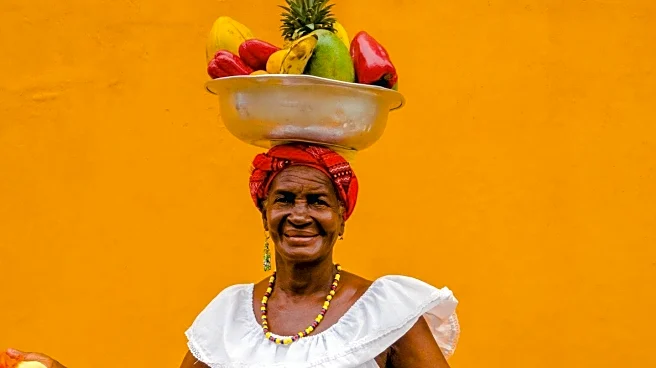What's Happening?
In Bogotá, Colombia, the Sueños Hechos Foundation organized a quinceañera celebration for 29 women, mostly grandmothers, who never had the opportunity to celebrate their 15th birthday due to childhood hardships. The event featured traditional elements
such as flowing dresses, tiaras, and limousine rides. The women, aged between 60 and 85, were selected through an open call on social media. The foundation, led by Freddy Alfonso Páez, has been hosting these events for older women for five years, providing celebrations to 128 women so far. The event was supported by sponsors who donated dresses, food, and limousine services, while police officers participated as escorts.
Why It's Important?
The quinceañera celebration for these grandmothers highlights the cultural significance of this tradition in Latin America, where it marks a girl's transition into adulthood. The event underscores the socio-economic challenges faced by many families in Colombia, where poverty rates are high, and such celebrations are often out of reach. By providing these women with a belated celebration, the foundation not only honors their cultural heritage but also brings attention to issues of inequality and poverty. This initiative offers a sense of community and joy to those who missed out on this important milestone in their youth.
What's Next?
The Sueños Hechos Foundation plans to continue hosting quinceañera celebrations for older women, with the aim of reaching more individuals who missed out on this tradition. The foundation relies on donations and community support to organize these events, and future celebrations will likely continue to involve local sponsors and volunteers. As awareness of the foundation's work grows, it may inspire similar initiatives in other regions, promoting cultural inclusivity and support for underprivileged communities.
Beyond the Headlines
This event highlights the broader cultural and social implications of celebrating traditional milestones later in life. It raises questions about the accessibility of cultural traditions for marginalized groups and the role of community organizations in bridging these gaps. The celebration also serves as a reminder of the enduring impact of socio-economic disparities on personal and cultural experiences.














